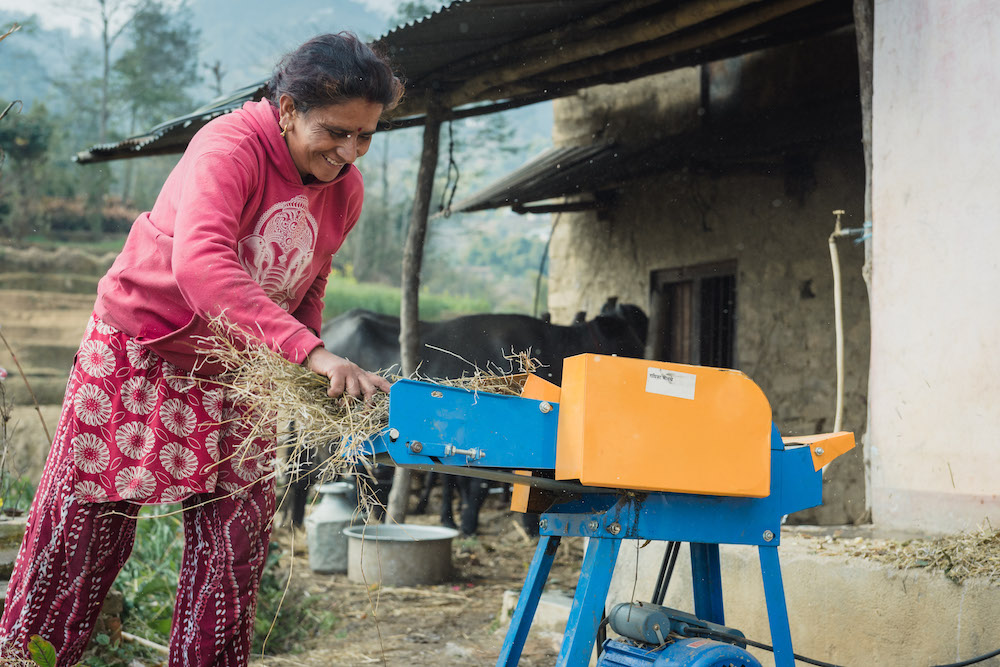This Article in Brief
- Automating everyday farming activities is essential to increasing production and income.
- Farmers across Nepal often can’t afford their own modern-day machinery, so they rely on support from local cooperatives.
- A Feed the Future-supported private sector partnership with cooperatives in Nepal provides training and access to machines to 200,000 farming families across 25 districts.
Many farmers in Nepal don’t have access to modern farming machinery and processes, which limits their production and minimizes their profits. Radhika Bolakhe has felt this firsthand. For years she made a living by running a dairy business and manually cutting hay for feed. With no money to invest in a mechanical cutter, Bolakhe found it extremely difficult to take on more livestock and grow her business.
From Manual to Mechanical
After identifying this need for modern farming machinery and improved agricultural technology, the Feed the Future Nepal Knowledge Based Integrated Sustainable Agriculture in Nepal (KISAN II) project began engaging local organizations, such as farming cooperatives, to support smallholder farmers like Bolakhe.

Photo by Winrock International
In Bolakhe’s Kavrepalanchok District, Feed the Future provided the Patikhoriya Cooperative with funding on a cost-sharing basis for training and technical advice to help them grow their business and better serve their more than 1,300 members. Now, the cooperative can reach its members through agricultural technicians who provide direct extension services, helping to distribute and demonstrate agricultural tools and equipment – such as mini tillers and electric water pumps. The cooperative, farmers and municipal government all provided funding to share the cost of this joint initiative with Feed the Future to introduce mechanical solutions. As a result, farmers like Bolakhe gain access to the machines at a discounted rate as well as information on how to use them.
Increasing Speed and Sales
“We could not afford the machinery needed to chop hay and straw on our own,” Bolakhe said. “Thanks to the support from the cooperative, my workload has now decreased and my livestock receives nutritious feed.”
Automating the cutting process enabled Bolakhe to cut more hay in less time and reduce her production costs. Prior to automation, it took more than two hours to manually cut the feed needed for her livestock – now it takes her just 20 minutes.

Photo by Winrock International
By providing her livestock with a regular and ample supply of nutritious feed, Bolakhe has been able to boost her animals’ daily milk production, as well as her income from dairy sales, leaving her with enough money to purchase additional livestock and continue to grow her business. She has doubled her milk production and sales from 5-6 liters per day to about 13 liters per day and increased her annual income by $1,200 in just over a year.
In Nepal, Feed the Future partnered with 188 local businesses, including cooperatives, to provide technical assistance and financial support. These partnerships with USAID exposed local firms to new business models that strengthened their internal management practices, identified operational efficiencies, and expanded their services and products, allowing them to reach more customers, including previously underserved rural populations. As a result, nearly 200,000 farming families across 25 districts in Nepal gained access to improved agricultural technologies and inputs at affordable rates, and local agribusinesses increased their sales by 44 percent in 2019.
By working hand in hand with Nepal and leveraging municipal support, Feed the Future is helping agribusinesses and farming communities continue to develop and grow with enhanced farming techniques and machinery.
The Feed the Future Knowledge-based Integrated Sustainable Agriculture in Nepal (KISAN) II project, implemented by Winrock International, works in 25 districts of Nepal and uses a private sector-led facilitative approach to identify and address constraints within key market systems. KISAN II promotes the business case for buyers, intermediaries and service providers to improve their business outcomes through more substantial engagement with producers and other value chain actors.
Helpful Links:
Stay connected: Sign up to receive the latest information on the global effort to #endhunger.




